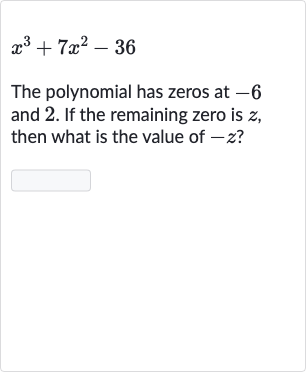Full solution
Q. The polynomial has zeros at and . If the remaining zero is , then what is the value of ?
- Factor Theorem: We know that the polynomial has zeros at and . Since polynomials are continuous and differentiable everywhere, we can use the Factor Theorem to express the polynomial as a product of its factors. The Factor Theorem states that if is a root of the polynomial, then is a factor of the polynomial.
- Finding Factors: First, we can write down the factors corresponding to the known zeros and . This gives us and as factors of the polynomial.
- Expanding Factors: Now, we can express the polynomial as the product of its factors and the unknown factor , where is the remaining zero. The polynomial can be written as .
- Coefficient Matching: To find the value of , we need to expand the known factors and set them equal to the given polynomial . Let's expand first.
- Equating Constant Terms: Next, we multiply the expanded expression by and set it equal to the given polynomial . However, we can also use the fact that the coefficients of the term in the polynomial must match. The coefficient of in the given polynomial is , and we already have a coefficient of from , so the coefficient from must be .
- Solving for z: Since we know that the coefficient of must be , and we have from , the remaining coefficient from must be . This means that the coefficient of in is already correct, and we do not need to adjust the factor . Therefore, we can conclude that the polynomial is equivalent to the given polynomial .
- Solving for : Since we know that the coefficient of must be , and we have from , the remaining coefficient from must be . This means that the coefficient of in is already correct, and we do not need to adjust the factor . Therefore, we can conclude that the polynomial is equivalent to the given polynomial .Now, we can equate the constant terms from the expanded form of to the constant term of the given polynomial, which is . The constant term from is , so when we multiply by , the constant term must be .
- Solving for z: Since we know that the coefficient of must be , and we have from , the remaining coefficient from must be . This means that the coefficient of in is already correct, and we do not need to adjust the factor . Therefore, we can conclude that the polynomial is equivalent to the given polynomial .Now, we can equate the constant terms from the expanded form of to the constant term of the given polynomial, which is . The constant term from is , so when we multiply by , the constant term must be . Solving for z, we divide both sides by .

